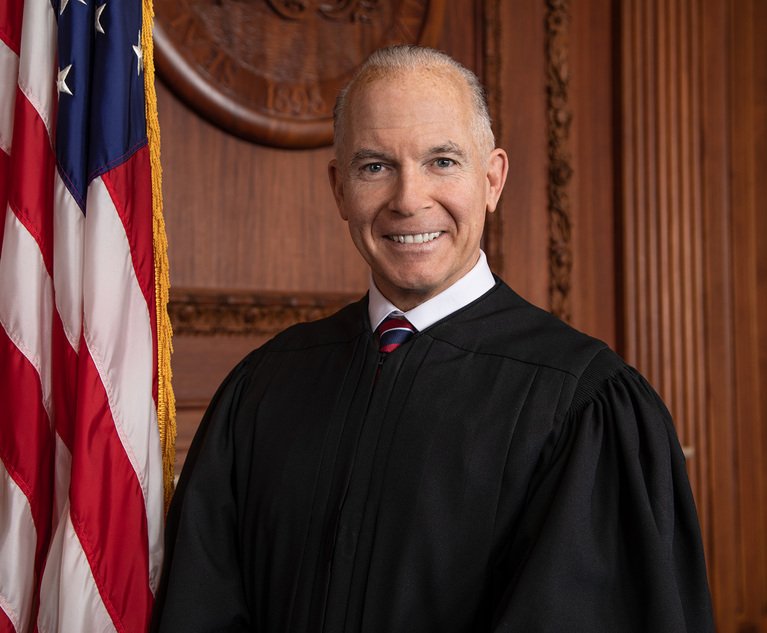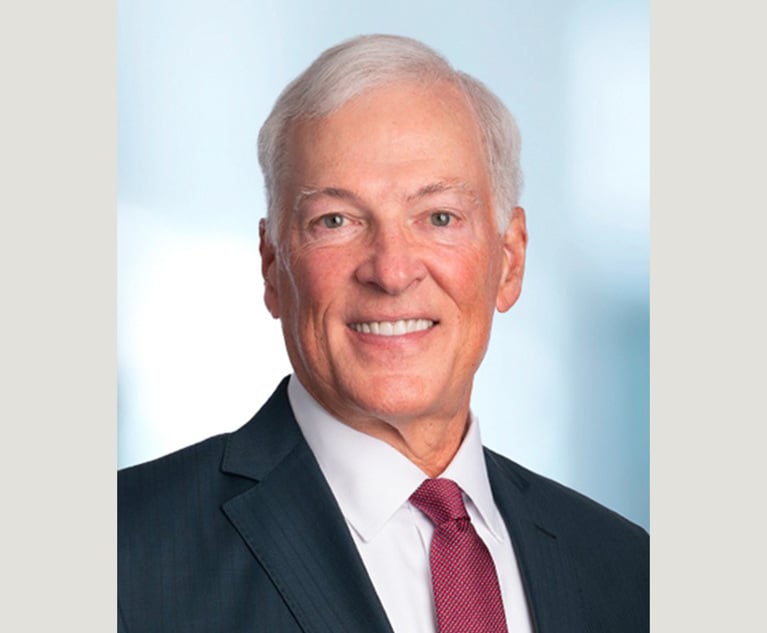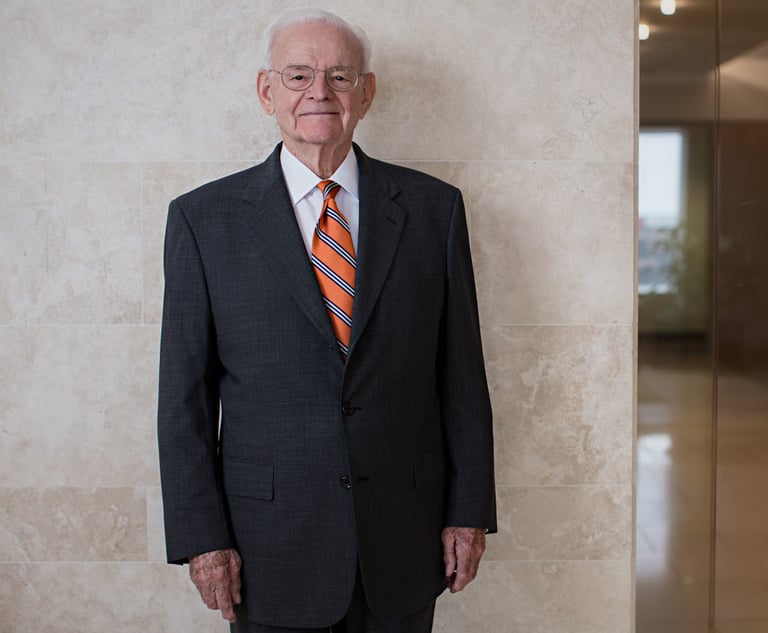 Pennsylvania Superior Court Judge Daniel McCaffery. Courtesy photo
Pennsylvania Superior Court Judge Daniel McCaffery. Courtesy photo Superior Court Judge Daniel McCaffery Runs for Pa. Supreme Court
Precedent should only be disregarded or altered where the particular issue has outlived its usefulness or created an injustice predicated on changing societal conditions.
October 03, 2023 at 09:00 AM
7 minute read
Candidate: Daniel McCaffery.
Court: Supreme Court.
Party: Democrat.
Pennsylvania Bar Association Rating: Highly recommended.
The following has been edited lightly for style.
The Legal Intelligencer: How would you describe your judicial philosophy?
Daniel McCaffery: To review the facts and law and to discern the statutory intent of any statute at issue to arrive at a fair and just resolution to the claim. As for constitutional analysis, I believe the constitution to be a "living document," intentionally drafted using broad language to allow for the development of laws to a changing society, consistent with the evolution of the law over 230 years.
The Legal: What makes you the best candidate for the role?
McCaffery: Values and experience. I bring over 32 years combined legal and judicial experience to the Supreme Court. I am the only candidate with extensive experience in both criminal prosecution and defense as well as private practice expertise. I helped build a successful law firm, have chaired the firm's litigation department and acted on the firm management committee. As a trial judge, I presided over 100 jury and several hundred bench trials, several thousand pre- and post-trial motions and written dozens of opinions. I am the only candidate with any appellate judicial expertise running for our commonwealth's highest appellate court. I have authored over 600 appellate opinions and participated in over 1,000. I was appointed supervising judge on the Superior Court for all wiretap applications, ensuring adherence to the law and was also appointed by the Supreme Court to the Court of Judicial Discipline, responsible for all disciplinary matters brought against judicial officers in Pennsylvania. I routinely lecture to law students on practice and procedure and have given CLE lectures on judicial ethics and recusal. I am an active and involved community leader who volunteers as a youth sports coach and for numerous charitable activities.
The Legal: What is the greatest threat to the practice of law or problem the profession faces?
McCaffery: The politicization of the judiciary. It is critical that our fellow citizens view the judiciary and the lawyers who participate in the process as nonpolitical. We must rise above partisan politics to create an environment where the public knows that every decision is fair and impartial and made without regard to personal or professional circumstance. The rule of law must be zealously guarded and protected so that society respects the court's decisions.
The Legal: What does your party membership say about you and your legal outlook?
McCaffery: That I will protect and defend the Constitution and its mandate to protect freedom and individual rights. That I will not deny free and fair elections and will demand adherence to the rule of law. As an attorney and a judge, I pledge to never allow partisan interference into a judicial decision. Every case will be decided on its merits and only after a careful review of the facts and application of existing law.
The Legal: Do you think courts in Pennsylvania have a perception problem when it comes to appearing partisan or polarized? If so, what would you do to combat this?
McCaffery: As my answers above indicate, I am very conscious of society's perception of the judiciary and its effect on liberal democracy.
The Legal: Several CLEs and bench-bar panels have recently addressed the growing phenomenon of distrust in the courts. In your view, how has distrust in the judiciary created challenges for the bench, and how should judges respond?
McCaffery: As stated above, judges should make every decision based upon a fair and impartial review of the facts and an unbiased review of the law applied to those facts. I firmly believe that it is the responsibility of attorneys to ensure the public's trust in those decisions through public statements and conduct, even where an attorney disagrees with the decision. It is incumbent on attorneys to reinforce the independence of the judiciary whenever possible. Judges must also adhere to higher ethical standards and avoid any appearance of impropriety. As a sitting member of the Court of Judicial Discipline, I know first-hand that the confidence of the public in the judiciary is best maintained where judges act with dignity and respect to all participants and avoid courtroom outbursts that demean the sanctity of the proceedings.
The Legal: What factors matter in deciding when recusal is necessary, and would you recuse yourself if a campaign contributor were involved in litigation as a party or attorney before you?
McCaffery: Recusal is always left to the discretion of the judge. Obviously, every judge should recuse where there is an actual conflict of interest. However, judges should also carefully consider recusal where there is even the appearance of impropriety. Doing so only reinforces the confidence of the public in a fair and impartial judiciary. I will recuse where a contributor is a party to a matter before the court.
The Legal: What two decisions or cases are you most proud of, and why? Conversely, what two opinions or cases would you like to take back or revise if you could, and why?
McCaffery: I have long prided myself in paying close and careful attention to every matter that I have handled as an attorney and as a judge. One piece of advice has stuck with me since I began the practice of law: and that is that for every party, the most important case in the entire system is the one they are involved with. As with any professional, I often second-guess what I might have done better in any particular case but there are no cases that I can honestly say I most proud of or would change.
The Legal: The relationship between the General Assembly and the Supreme Court appears to have become strained in recent years. Is that a concern, and, if elected to the high court, what would you do about that?
McCaffery: Frankly, I think the relationship between the General Assembly and Supreme Court is at an all time high. I believe that is because of the guidance and patience of the two most recent chief justices and their ability to forge relationships with leaders of the House and Senate and their willingness to listen to legitimate concerns without sacrificing the integrity of the courts. If elected, I would embrace the renewed partnership with our co-equal branch of government to make a more open, inclusive, fair and equitable court system and government.
The Legal: How important is stare decisis and when should a court depart from it?
McCaffery: Critically. Lawyers, their clients and the public have a right to know what the law is and to conform their conduct accordingly. Precedent should only be disregarded or altered where the particular issue has outlived its usefulness or created an injustice predicated on changing societal conditions.
The Legal: How important is consensus—particularly unanimous consensus—in appellate court opinions? Are there limits when a judge should only concur?
McCaffery: Every judge needs to follow his or her conscience. And no judge should willingly surrender the conviction of their belief simply to obtain consensus. That said, as the only appellate judge in the race for Supreme Court, a judge should always be willing to listen to their colleagues and change their opinion if convinced it is in error. Judges should always be open minded, fair and contemplative. Most importantly, judges should respect each other and even where they disagree, never be disagreeable.
The Legal: Who are your role models and mentors?
McCaffery: My parents are my role models. I don't have enough space to list all of my mentors but needless to say, after 32 years, there are many to whom I owe much. Several names that spring to mind include Joel Rosen, chief of the Philadelphia DA's Office Major Trials unit, Bob Nemeroff and Gary Jaffe, who gave me my start in the practice of law, Judges Jeff Minehart and Leon Tucker, supervising judges in the FJD and President Judge Jack Panella of the Superior Court and Superior Court Judge Anne Lazarus—my now-colleague who also doubled as my trial judge in Philadelphia. I learned from the best and owe them all a debt of gratitude.
NOT FOR REPRINT
© 2025 ALM Global, LLC, All Rights Reserved. Request academic re-use from www.copyright.com. All other uses, submit a request to [email protected]. For more information visit Asset & Logo Licensing.
You Might Like
View All
Superior Court Directs Western Pa. Judge to Recuse From Case Over Business Ties to Defendant
3 minute read
Saxton & Stump Lands Newly Retired Ex-Chief Judge From Middle District of Pa.
3 minute read
'Discordant Dots': Why Phila. Zantac Judge Rejected Bid for His Recusal
3 minute read
Judge Louis C. Bechtle: An American Jurist Who Relied on Common Sense, Sound Judgment and Fairness
5 minute readTrending Stories
- 1Uber Files RICO Suit Against Plaintiff-Side Firms Alleging Fraudulent Injury Claims
- 2The Law Firm Disrupted: Scrutinizing the Elephant More Than the Mouse
- 3Inherent Diminished Value Damages Unavailable to 3rd-Party Claimants, Court Says
- 4Pa. Defense Firm Sued by Client Over Ex-Eagles Player's $43.5M Med Mal Win
- 5Losses Mount at Morris Manning, but Departing Ex-Chair Stays Bullish About His Old Firm's Future
Who Got The Work
J. Brugh Lower of Gibbons has entered an appearance for industrial equipment supplier Devco Corporation in a pending trademark infringement lawsuit. The suit, accusing the defendant of selling knock-off Graco products, was filed Dec. 18 in New Jersey District Court by Rivkin Radler on behalf of Graco Inc. and Graco Minnesota. The case, assigned to U.S. District Judge Zahid N. Quraishi, is 3:24-cv-11294, Graco Inc. et al v. Devco Corporation.
Who Got The Work
Rebecca Maller-Stein and Kent A. Yalowitz of Arnold & Porter Kaye Scholer have entered their appearances for Hanaco Venture Capital and its executives, Lior Prosor and David Frankel, in a pending securities lawsuit. The action, filed on Dec. 24 in New York Southern District Court by Zell, Aron & Co. on behalf of Goldeneye Advisors, accuses the defendants of negligently and fraudulently managing the plaintiff's $1 million investment. The case, assigned to U.S. District Judge Vernon S. Broderick, is 1:24-cv-09918, Goldeneye Advisors, LLC v. Hanaco Venture Capital, Ltd. et al.
Who Got The Work
Attorneys from A&O Shearman has stepped in as defense counsel for Toronto-Dominion Bank and other defendants in a pending securities class action. The suit, filed Dec. 11 in New York Southern District Court by Bleichmar Fonti & Auld, accuses the defendants of concealing the bank's 'pervasive' deficiencies in regards to its compliance with the Bank Secrecy Act and the quality of its anti-money laundering controls. The case, assigned to U.S. District Judge Arun Subramanian, is 1:24-cv-09445, Gonzalez v. The Toronto-Dominion Bank et al.
Who Got The Work
Crown Castle International, a Pennsylvania company providing shared communications infrastructure, has turned to Luke D. Wolf of Gordon Rees Scully Mansukhani to fend off a pending breach-of-contract lawsuit. The court action, filed Nov. 25 in Michigan Eastern District Court by Hooper Hathaway PC on behalf of The Town Residences LLC, accuses Crown Castle of failing to transfer approximately $30,000 in utility payments from T-Mobile in breach of a roof-top lease and assignment agreement. The case, assigned to U.S. District Judge Susan K. Declercq, is 2:24-cv-13131, The Town Residences LLC v. T-Mobile US, Inc. et al.
Who Got The Work
Wilfred P. Coronato and Daniel M. Schwartz of McCarter & English have stepped in as defense counsel to Electrolux Home Products Inc. in a pending product liability lawsuit. The court action, filed Nov. 26 in New York Eastern District Court by Poulos Lopiccolo PC and Nagel Rice LLP on behalf of David Stern, alleges that the defendant's refrigerators’ drawers and shelving repeatedly break and fall apart within months after purchase. The case, assigned to U.S. District Judge Joan M. Azrack, is 2:24-cv-08204, Stern v. Electrolux Home Products, Inc.
Featured Firms
Law Offices of Gary Martin Hays & Associates, P.C.
(470) 294-1674
Law Offices of Mark E. Salomone
(857) 444-6468
Smith & Hassler
(713) 739-1250





